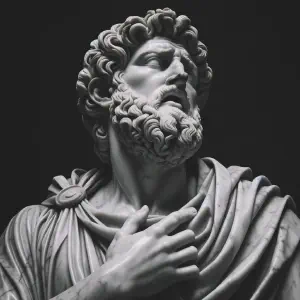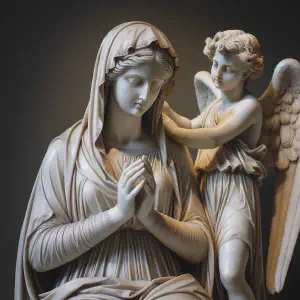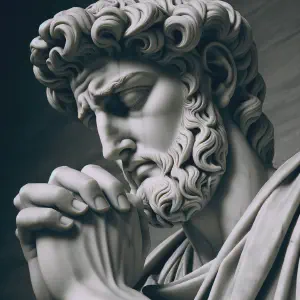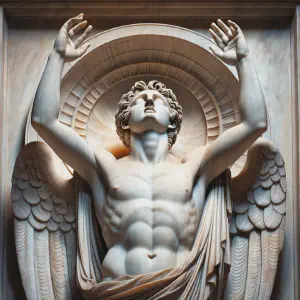The Promise and the Fulfillment



The apostle Paul, in his letter to the Romans, spoke of the revelation of this mystery, once hidden but now manifested. This revelation of Jesus Christ, in line with the prophetic writings, was to be made known to all nations, leading them to the obedience of faith. In this unfolding narrative, spanning from David’s desire to build a physical temple to Mary’s acceptance of her role in God’s plan, the promise of an eternal kingdom found its truest expression, not in a structure of wood and stone, but in the person of Jesus Christ, uniting heaven and earth in an eternal covenant of love and redemption.
Five Questions
How does King David’s desire to build a temple for the Lord contrast with God’s response to him?
David’s intention to build a temple represents his desire to honor God with a grand, physical structure. However, God’s response shifts the focus from a physical temple to a spiritual dynasty. Instead of endorsing David’s plan, God promises to establish a lasting house for David, symbolizing a spiritual lineage rather than a physical building. This highlights the idea that God’s plans often transcend our material intentions and focus more on spiritual and eternal legacies.
What significance does the covenant with David hold in the context of these readings?
The covenant with David is central to these readings, symbolizing God’s unwavering commitment and faithfulness. It’s not just a promise of a dynasty but a foreshadowing of Jesus Christ, who is from the lineage of David. This covenant is an assurance of God’s eternal kindness and the establishment of a kingdom that will endure forever, ultimately fulfilled in the coming of Christ, the everlasting King.
In the Annunciation, how does Mary’s response to the angel Gabriel reflect her faith and role in God’s plan?
Mary’s response, “May it be done to me according to your word,” is a profound expression of her faith and humility. Despite the uncertainty and potential social stigma, she accepts her role in God’s plan with complete trust and obedience. This moment is pivotal as it signifies human cooperation in the divine plan of salvation. Mary’s acceptance marks the beginning of the fulfillment of the promises made to David, highlighting the importance of faith and obedience in fulfilling God’s will.
How does Paul’s letter to the Romans tie into the theme of God’s revealed mystery and the fulfillment of His promises?
Paul’s letter to the Romans speaks of the revelation of a mystery that was kept secret for long ages but is now disclosed through Jesus Christ. This ties into the theme of God’s promises being fulfilled over time. Paul emphasizes that this revelation, once hidden, is now manifest to all nations, signifying the universal scope of Christ’s mission and the fulfillment of God’s promises through Him. This connection underscores the continuity of God’s plan from the Old Testament to the New Testament.
What overarching message do these readings convey about the nature of God’s promises and our response to them?
These readings collectively convey that God’s promises are eternal, transcending time and our human understanding. They teach us about the nature of divine fidelity and the importance of our response to God’s call. While our plans may be grounded in the physical and immediate, God’s plans are often far-reaching and spiritual. Our role, as exemplified by Mary and prophesied in the Old Testament, is to trust and obey, understanding that God’s promises, though they may unfold in unexpected ways, are always grounded in love and lead to ultimate redemption.
Bible Study
2 Samuel 7:1-5, 8b-12, 14a, 16
When King David was settled in his palace,
and the LORD had given him rest from his enemies on every side,
he said to Nathan the prophet,
“Here I am living in a house of cedar,
while the ark of God dwells in a tent!”
Nathan answered the king,
“Go, do whatever you have in mind,
for the LORD is with you.”
But that night the LORD spoke to Nathan and said:
“Go, tell my servant David, ‘Thus says the LORD:
Should you build me a house to dwell in?’
“It was I who took you from the pasture
and from the care of the flock
to be commander of my people Israel.
I have been with you wherever you went,
and I have destroyed all your enemies before you.
And I will make you famous like the great ones of the earth.
I will fix a place for my people Israel;
I will plant them so that they may dwell in their place
without further disturbance.
Neither shall the wicked continue to afflict them as they did of old,
since the time I first appointed judges over my people Israel.
I will give you rest from all your enemies.
The LORD also reveals to you
that he will establish a house for you.
And when your time comes and you rest with your ancestors,
I will raise up your heir after you, sprung from your loins,
and I will make his kingdom firm.
I will be a father to him,
and he shall be a son to me.
Your house and your kingdom shall endure forever before me;
your throne shall stand firm forever.”
This passage features King David, a central Old Testament figure known for his leadership of Israel and his heart for God. David expresses a desire to build a temple for the Lord, highlighting his devotion. However, God’s response, delivered through the prophet Nathan, emphasizes that God’s plans transcend human intentions. This aligns with Catholic values of humility and divine providence, reminding believers that God’s purposes are often beyond human understanding, and His guidance is paramount (Catechism of the Catholic Church providence). It also foreshadows the Davidic Covenant, foundational for understanding Jesus Christ’s messianic role.
Psalm 89:2-3, 4-5, 27, 29
R. (2a) For ever I will sing the goodness of the Lord.
The promises of the LORD I will sing forever;
through all generations my mouth shall proclaim your faithfulness.
For you have said, “My kindness is established forever”;
in heaven you have confirmed your faithfulness.
R. For ever I will sing the goodness of the Lord.
“I have made a covenant with my chosen one,
I have sworn to David my servant:
Forever will I confirm your posterity
and establish your throne for all generations.”
R. For ever I will sing the goodness of the Lord.
“He shall say of me, ‘You are my father,
my God, the Rock, my savior.’
Forever I will maintain my kindness toward him,
and my covenant with him stands firm.”
R. For ever I will sing the goodness of the Lord.
Psalm 89 is a poetic expression of God’s faithfulness to His covenant with David. It emphasizes the steadfast love and faithfulness of God, a theme central to Catholic teachings on God’s unchanging nature (Catechism of the Catholic Church God’s nature). The psalmist, likely Ethan the Ezrahite, reflects on God’s promises to David, aligning with the values of hope and trust in God’s eternal plan. This psalm echoes Catholic teachings on the importance of God’s covenants as a sign of His love and the foundation for salvation history.
Romans 16:25-27
Brothers and sisters:
To him who can strengthen you,
according to my gospel and the proclamation of Jesus Christ,
according to the revelation of the mystery kept secret for long ages
but now manifested through the prophetic writings and,
according to the command of the eternal God,
made known to all nations to bring about the obedience of faith,
to the only wise God, through Jesus Christ
be glory forever and ever. Amen.
In this doxology by Apostle Paul, a key figure in the early Church known for his missionary journeys and epistles, he speaks of the revelation of the mystery kept secret but now revealed through Jesus Christ. This aligns with the Catholic understanding of divine revelation (Dei Verbum, Vatican II) and the universality of Christ’s message, foundational in Catholic missions and evangelization. It reflects the Catholic values of faith in Jesus Christ and the obedience of faith, underscoring the importance of the New Testament in revealing God’s plan for humanity.
Luke 1:26-38
The angel Gabriel was sent from God
to a town of Galilee called Nazareth,
to a virgin betrothed to a man named Joseph,
of the house of David,
and the virgin’s name was Mary.
And coming to her, he said,
“Hail, full of grace! The Lord is with you.”
But she was greatly troubled at what was said
and pondered what sort of greeting this might be.
Then the angel said to her,
“Do not be afraid, Mary,
for you have found favor with God.
“Behold, you will conceive in your womb and bear a son,
and you shall name him Jesus.
He will be great and will be called Son of the Most High,
and the Lord God will give him the throne of David his father,
and he will rule over the house of Jacob forever,
and of his kingdom there will be no end.”
But Mary said to the angel,
“How can this be,
since I have no relations with a man?”
And the angel said to her in reply,
“The Holy Spirit will come upon you,
and the power of the Most High will overshadow you.
Therefore the child to be born
will be called holy, the Son of God.
And behold, Elizabeth, your relative,
has also conceived a son in her old age,
and this is the sixth month for her who was called barren;
for nothing will be impossible for God.”
Mary said, “Behold, I am the handmaid of the Lord.
May it be done to me according to your word.”
Then the angel departed from her.
The Annunciation to Mary, a young Jewish woman of Nazareth, introduces the Incarnation, a cornerstone of Catholic faith. Mary’s humble acceptance of her role, ‘May it be done to me according to your word,’ exemplifies the virtues of faith, obedience, and humility, aligning with Catholic teachings on Mary as a model of discipleship (Lumen Gentium, Vatican II). This passage also illustrates the fulfillment of God’s promises and the role of grace in salvation history, resonating with Catholic doctrines on grace and divine providence.
Lessons
These passages illuminate God’s enduring faithfulness and the unfolding of His divine plan. King David’s desire to build a temple contrasts with God’s promise of an everlasting dynastic lineage. The psalmist celebrates this covenant, affirming God’s steadfast love and fidelity. In the New Testament, this promise finds fulfillment in the Annunciation to Mary, who humbly accepts her role in bearing Jesus, the heir to David’s throne. The apostle Paul’s words remind us that God’s mysteries, once hidden, are now revealed to all through Christ. These readings teach us about trusting in God’s plan, the power of humble obedience, and the eternal nature of God’s promises.
Meditation Prayer


